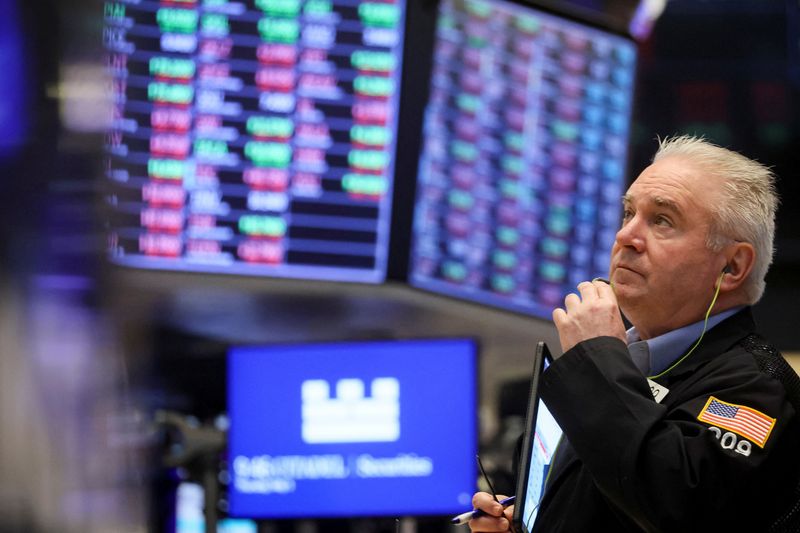This post was originally published on this site

Investing.com — The S&P 500 struggled for direction Wednesday after Federal Reserve Chairman Jerome Powell reiterated the central bank’s commitment to keep tightening monetary policy to bring down inflation just as data showed a faster than expected decline in quarterly economic growth.
The S&P 500 rose 0.2%, the Dow Jones Industrial Average gained 0.6%, or 195 points, the Nasdaq was up 0.14%
“The way to do that [curb inflation] is to slow down [economic] growth, but ideally keep it positive,” Powell said on Wednesday, though conceded that there “is a risk” that the fed may go too far and cause a recession. The Fed chief, however, stressed that the biggest threat to the economy isn’t the Fed overshooting monetary policy tightening, but rather “failing to restore price stability.”
The Fed’s policy measures appear to be already having the desired impact, with the latest economic data showing the first contraction in quarterly U.S. GDP since Q2 2020.
The final reading of first-quarter GDP unexpectedly was revised down by 0.1% to a 1.6% contraction on an annualized basis in the final Q1 report.
Treasury yields gave up some gains, pushing growth sectors like tech higher. Apple (NASDAQ:AAPL) and Microsoft (NASDAQ:MSFT) led the gains for big tech, up more than 1%.
But a fall in semiconductor stocks kept gains in broader markets in check with a more than 3% decline in NVIDIA (NASDAQ:NVDA) and Advanced Micro Devices (NASDAQ:AMD).
Snap (NYSE:SNAP), meanwhile, detailed plans to launch a $3.99 per month subscription plan, Snapchat+, for social media platform Snapchat. The subscription service set to launch this week isn’t expected to become a “material source of revenue” the company said. The shares were flat after giving up early-day gains.
Energy stocks fell more than 2% after oil prices were pressured by ongoing worries that softer global growth will hurt energy demand.
Consumer discretionary stocks flirted with gains and losses under pressure from a slump in cruise operator Carnival.
Carnival (NYSE:CCL) sank more than 14% after Morgan Stanley cut its price target on the stock to $7 per share from $13 on worries the company’s debt levels pose a serious risk should another shock to demand emerge.
Other cruise operators including Norwegian Cruise Line (NYSE:NCLH) and Royal Caribbean Cruises (NYSE:RCL) fell more than 9%.
On the earnings front, meanwhile, investors digested mostly better-than-expected quarterly results; however, inflation is expected to continue to weigh on growth.
General Mills (NYSE:GIS) reported quarterly results that beat on both the top and bottom lines, but the food producer forecast weaker-than-expected growth for the full-year on concerns about inflation and a consumer shift in demand to lower priced goods. Its shares rose 6%.
Bed Bath & Beyond (NASDAQ:BBBY) fell 21% after reporting a wider than expected loss in the first quarter, and announcing that Mark Tritton will step down as chief executive officer.
McCormick (NYSE:MKC) delivered lower-than-expected quarterly results and cut its full-year outlook, citing higher costs and supply chain issues. Its shares gained more 2%.
In other news, Nio (NYSE:NIO) denied allegations from Grizzly Research that the Chinese electric carmaker was inflating its revenue from battery sales to Wuhan Weineng Battery Asset in which it has a nearly 20% stake.


